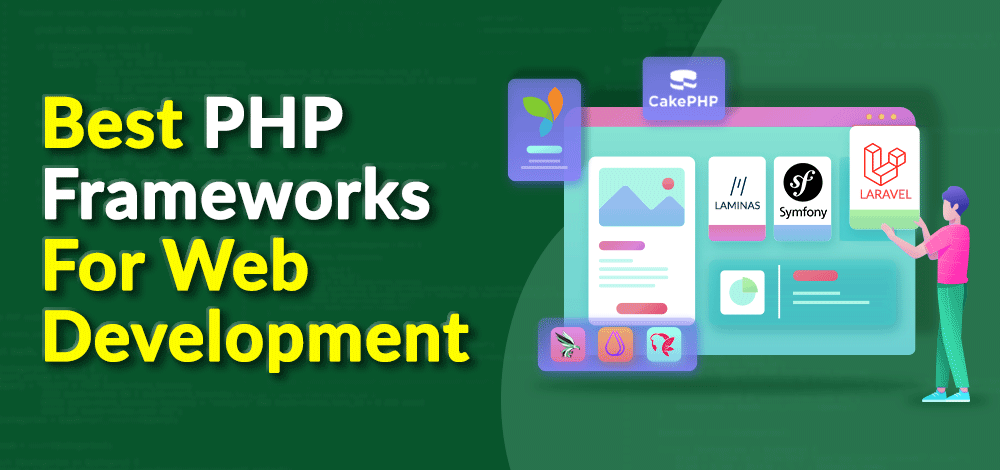Popular PHP frameworks may want to try out for PHP developers

PHP, a server-side scripting language, has evolved significantly over the years, becoming a cornerstone in web development. To enhance the efficiency and structure of PHP applications, developers often turn to frameworks. In this blog post, we’ll explore a curated list of popular PHP frameworks that have revolutionized the way developers build robust, scalable, and maintainable web applications.
- Laravel:
- Overview: Laravel has emerged as a PHP framework of choice, known for its elegant syntax, expressive features, and an extensive ecosystem. It follows the MVC (Model-View-Controller) pattern, making it intuitive and developer-friendly.
- Key Features: Eloquent ORM, Blade templating engine, Artisan command-line tool, Laravel Mix for asset compilation.
- Key Features of Laravel:
- Eloquent ORM:
- Detail: Elegant ActiveRecord implementation simplifying database interactions.
- Blade Templating Engine:
- Detail: Intuitive and lightweight templating engine for efficient view management.
- Artisan Command-Line Tool:
- Detail: Robust CLI for automating tasks, code generation, and managing migrations.
- Laravel Mix:
- Detail: Webpack-powered asset compilation for simplified frontend development.
- Middleware:
- Detail: Enables filtering HTTP requests entering the application, enhancing security.
- Laravel Horizon:
- Detail: Elegant dashboard and supervisor for monitoring and managing queues.
- Laravel Passport:
- Detail: OAuth2 server implementation for API authentication and authorization.
- Laravel Nova:
- Detail: Admin panel for seamless management and monitoring of Laravel applications.
- Broadcasting and Real-Time Events:
- Detail: Simplifies real-time updates using broadcasting and event-driven architecture.
- Laravel Forge:
- Detail: Server provisioning and management for effortless deployment.
Laravel’s rich feature set and elegant syntax make it a top choice for PHP developers, enabling rapid and scalable application development.
- Eloquent ORM:
- Symfony:
- Overview: Symfony is a robust and highly modular PHP framework. It provides reusable components and follows the MVC architecture. Symfony is widely adopted for its flexibility and the ability to scale from small projects to large enterprise applications.
- Key Features: Symfony Components, Twig templating engine, Doctrine ORM, Symfony Console.
- CodeIgniter:
- Overview: CodeIgniter is a lightweight yet powerful PHP framework, known for its straightforward configuration and minimal coding requirements. It is an excellent choice for developers who prefer a simple and efficient framework for rapid development.
- Key Features: MVC architecture, no strict coding rules, exceptional performance.
- Yii:
- Overview: Yii is a high-performance PHP framework known for its efficiency in developing modern web applications. It follows the DRY (Don’t Repeat Yourself) principle and promotes rapid development through code generation tools.
- Key Features: Gii code generator, powerful caching support, integration with jQuery.
- Zend Framework:
- Overview: Zend Framework is an enterprise-grade PHP framework that follows the best practices of object-oriented programming. It offers a collection of PHP packages that can be used independently, providing flexibility to developers.
- Key Features: Modularity, support for various database systems, robust security features.
- Slim:
- Overview: Slim is a micro-framework designed for simplicity and minimalism. It is an excellent choice for building small to medium-sized web applications and APIs. Slim is known for its fast performance and ease of use.
- Key Features: Middleware support, customizable error handling, RESTful routing.
- Phalcon:
- Overview: Phalcon is a full-stack PHP framework implemented as a C extension. It is known for its high performance and low resource consumption. Phalcon’s architecture is designed for speed and efficiency.
- Key Features: C-extension for performance, MVC architecture, asset management.
- CakePHP:
- Overview: CakePHP is a feature-rich PHP framework that follows the convention over configuration (CoC) and don’t repeat yourself (DRY) principles. It simplifies the development process and emphasizes convention-based coding.
- Key Features: Integrated CRUD scaffolding, built-in validation, flexible templating.
Conclusion:
Selecting the right PHP framework is crucial for the success of a web development project. Each framework mentioned here has its strengths, and the choice depends on the project requirements, development philosophy, and personal preferences. Whether you’re drawn to the elegance of Laravel, the modularity of Symfony, or the simplicity of CodeIgniter, exploring these frameworks opens up a world of possibilities for crafting exceptional web applications. As you embark on your web development journey, consider the unique features and strengths of each framework to make an informed decision that aligns with your project goals. Happy coding!
